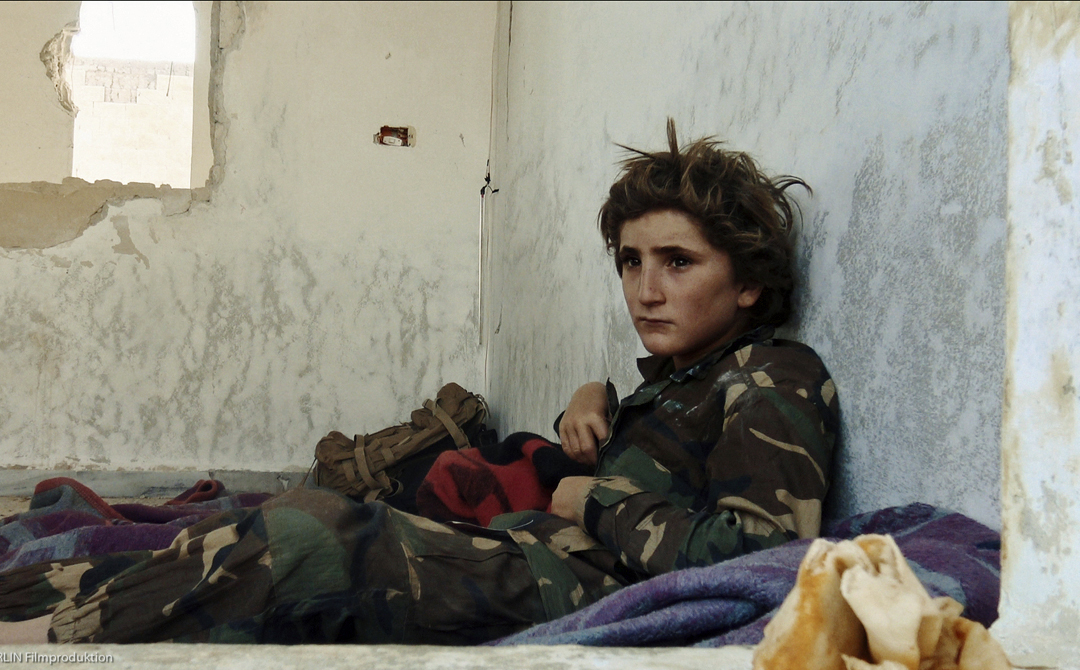A CO-PRODUCTION OF VENTANA FILM WITH BASIS FILMPRODUKTION, CINEMA GROUP PRODUCTION, SWR AND RBB IN COOPERATION WITH ARTE AND IMPACT PARTNERS.
The documentary "Kinder des Kalifats" (original title: "Of Fathers and Sons") by Berlin-based Syrian filmmaker Talal Derki tells of the everyday life of the extended family of rebel leader Abu Osama and his two eldest sons Osama and Ayman during the war in Syria. The family lives in a village in the northwest of the country, near Idlib, an area dominated by radical Salafists. Since they succeeded in driving out President Assad's government troops, the Islamists of the Al Nusra Front have begun mobilising young people, even children, in the name of religion and training them as fighters. The goal is to establish a caliphate that the next generation and the one after that will carry on their shoulders and complete. Translated with www.DeepL.com/Translator (free version)
Abu Osama (45) is a senior leader of the Al-Nusra Brigades. His two eldest sons bear the first names of the founder of Al Qaeda, Osama bin Laden and his deputy Ayman Al Zawahiri. His youngest son, Mohammed, was named after one of the September 11 terrorists, Mohammed Atta. Thirteen-year-old Osama and his twelve-year-old brother Ayman grow up in this family together with six other siblings. From childhood, their upbringing is exposed to the influence of the ideology of Al-Qaeda and Salafism. Translated with www.DeepL.com/Translator (free version)
Talal Derki and his cameraman Abu Adnan, who also worked on Derki's multi-award-winning film "Return to Homs", followed Abu Osama and the children as well as other members of the clan with their camera for more than two years. Due to the exclusive access granted to him, the filmmaker was able to gain a unique insight into the inner workings of a Salafist family and a radical Islamic group and portray them on film. Derki posed as a war reporter and sympathiser of the Salafist ideology. This enabled him to gain the trust of the family and the entire clan.




Above all, the direct and open access to the young protagonists lets the audience suspect what this war and the Islamist ideology is doing to them. Fighting flares up again and again. The situation around Idlib is unstable. The Syrian army had mined everything before withdrawing, and deadly danger lurks on roads, in fields, under trees or in the ruins of bombed-out houses. Above all, the search for landmines puts Abu Osama and his helpers in constant danger of their lives. Abu Osama, who was himself severely tortured in prison, is a deeply religious, convinced Salafist who, in the fight against the regime, has no qualms about building bombs and paying back enemy soldiers and policemen in kind for what happened to him. At the same time, he is a loving father to whom his children, especially his sons, mean everything.
The film follows Osama and Ayman in their everyday life in the family, playing, learning. They do not go to a normal school like many of the children in the village. The study of the Koran is supposed to replace learning arithmetic and writing. In a training camp run by Al-Nusra, they are supposed to learn how to handle weapons and military discipline. In a few years, they will go to war according to the adults' idea. Ayman and Osama are very different characters. While the older one wants to follow his father's example and is committed to the training in the camp, the sensitive Ayman is sceptical about the hard and also dangerous training. He completes the combat training rather reluctantly.
After two years, the two brothers finally part ways. Talal Derki makes the feelings behind the protagonists' actions tangible through direct and open access to Abu Osama and the sons. In doing so, he enables the audience to sense the price people have to pay in this cruel civil war.
The film received numerous awards and was shown with great success at international festivals. Among others, it was nominated for the Oscar 2019, received the German Film Award 2019 and the "World Cinema Documentary Grand Jury Prize" at the "Sundance Film Festival" 2018.
- Documentary by Talal Derki
- 99 minutes
- 2018

